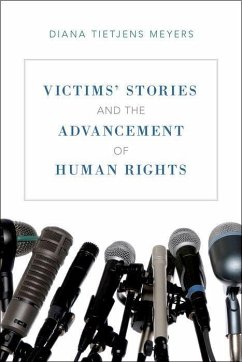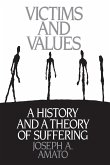Diana Tietjens Meyers
VICTIMS STORIES ADV HUMAN RIGHT P
Diana Tietjens Meyers
VICTIMS STORIES ADV HUMAN RIGHT P
- Broschiertes Buch
- Merkliste
- Auf die Merkliste
- Bewerten Bewerten
- Teilen
- Produkt teilen
- Produkterinnerung
- Produkterinnerung
Victim's Stories and the Advancement of Human Rights addresses questions suggested by the worldwide persistence of human rights abuse and the prevalence of appeals to victims' stories in human rights campaigns, truth commissions, and international criminal tribunals.
Andere Kunden interessierten sich auch für
![Stories of Mukunda - Early Life of Paramahansa Yogananda Stories of Mukunda - Early Life of Paramahansa Yogananda]() Swami YoganandaStories of Mukunda - Early Life of Paramahansa Yogananda8,99 €
Swami YoganandaStories of Mukunda - Early Life of Paramahansa Yogananda8,99 €![Victims and Values Victims and Values]() Joseph AmatoVictims and Values41,99 €
Joseph AmatoVictims and Values41,99 €![Diakka and Their Earthly Victims Diakka and Their Earthly Victims]() Andrew Jackson DavisDiakka and Their Earthly Victims21,99 €
Andrew Jackson DavisDiakka and Their Earthly Victims21,99 €![Narrative Ethics in Public Health: The Value of Stories Narrative Ethics in Public Health: The Value of Stories]() Narrative Ethics in Public Health: The Value of Stories38,99 €
Narrative Ethics in Public Health: The Value of Stories38,99 €![Victims and Values Victims and Values]() Joseph A. AmatoVictims and Values101,99 €
Joseph A. AmatoVictims and Values101,99 €![Shaped by Stories Shaped by Stories]() Marshall GregoryShaped by Stories38,99 €
Marshall GregoryShaped by Stories38,99 €![Narrative Ethics in Public Health: The Value of Stories Narrative Ethics in Public Health: The Value of Stories]() Narrative Ethics in Public Health: The Value of Stories38,99 €
Narrative Ethics in Public Health: The Value of Stories38,99 €-
-
-
Victim's Stories and the Advancement of Human Rights addresses questions suggested by the worldwide persistence of human rights abuse and the prevalence of appeals to victims' stories in human rights campaigns, truth commissions, and international criminal tribunals.
Hinweis: Dieser Artikel kann nur an eine deutsche Lieferadresse ausgeliefert werden.
Hinweis: Dieser Artikel kann nur an eine deutsche Lieferadresse ausgeliefert werden.
Produktdetails
- Produktdetails
- Verlag: OUP US
- Seitenzahl: 276
- Erscheinungstermin: 11. Mai 2016
- Englisch
- Abmessung: 210mm x 140mm x 15mm
- Gewicht: 342g
- ISBN-13: 9780199930401
- ISBN-10: 0199930406
- Artikelnr.: 47866916
- Herstellerkennzeichnung
- Libri GmbH
- Europaallee 1
- 36244 Bad Hersfeld
- gpsr@libri.de
- Verlag: OUP US
- Seitenzahl: 276
- Erscheinungstermin: 11. Mai 2016
- Englisch
- Abmessung: 210mm x 140mm x 15mm
- Gewicht: 342g
- ISBN-13: 9780199930401
- ISBN-10: 0199930406
- Artikelnr.: 47866916
- Herstellerkennzeichnung
- Libri GmbH
- Europaallee 1
- 36244 Bad Hersfeld
- gpsr@libri.de
Diana Tietjens Meyers is Professor Emerita of Philosophy at University of Connecticut, Storrs; author of several books including GENDER IN THE MIRROR: CULTURAL IMAGERY AND WOMEN'S AGENCY (2002, OUP; 231 cl, 317 p LTD)
* Acknowledgments
* Introduction
* Chapter 1: Two Victim Paradigms and the Problem of "Impure " Victims
* 1. Two Victim Paradigms
* A. The Pathetic Victim Paradigm
* B. The Heroic Victim Paradigm
* 2. Controversial - "Impure " - Victims
* A. Trafficked Sex Workers
* B. Death Row Inmates
* 3. Parameters of Innocence
* A. Getting Real about Innocence
* B. The Victim Paradigms Revisited
* C. Reconceiving the Innocence of Victims
* 4. Reclaiming Victim Discourse
* Chapter 2: Narrative Structures, Narratives of Abuse, And Human
Rights
* 1. The Amsterdam/Bruner Account of Narrative
* 2. Narrative Regimentation, Social Exclusion, and Truth Forfeiture
* 3. Hayden White's Account of Narrative and Closure
* 4. Spelman's Account of Normativity in a Victim's Story
* 5. Strejilevich's Skepticism about Normativity in Victims' Stories
* 6. Varieties of Moral Closure
* 7. Moral Closure without Moral Resolution
* Chapter 3: Learning from Victims' Stories: The Promise and Problems
of Emotional Understanding
* 1. Narrative Artifice: Arbitrary and Non-Rational?
* 2. Affective Intelligence and Moral Understanding
* 3. Scenes from a Child Soldier's Story
* 4. Imaginative Resistance to a Child Soldier's Story
* 5. Emotionally Understanding a Child Soldier's Story
* 6. Humanitarianism, Human Rights, and Affective Understanding
* Chapter 4: Empathy and the Meanings of Human Rights in Human Lives
* 1. Peter Goldie's Critique of Empathy
* 2. A Conception of Empathy for Moral Philosophy
* 3. Why Empathy Is (Isn't) a Moral Power
* A. Empathy and Altruistic Action
* B. Empathy and Moral Understanding
* 4. Empathy, Embodiment, and Suffering
* 5. A Woman in Berlin Eight Weeks in the Conquered City
* 6. Empathy, Victims' Stories, and Human Rights
* Chapter 5: The Ethics and Politics of Putting Victims' Stories to
Work
* 1. The Problem of Victim Derogation and Blaming
* 2. The Ethics of Using Victims' Stories to Promote Human Rights
* A. Aid and Research Projects
* B. Justice Projects
* 3. Ethical Politics: Civil Society and Advancing Human Rights
* A. Ethical Practices Within Human Rights Groups
* B. Ethical Relations Among Human Rights NGOs
* 4. Concluding Reflections
* References
* Index
* Introduction
* Chapter 1: Two Victim Paradigms and the Problem of "Impure " Victims
* 1. Two Victim Paradigms
* A. The Pathetic Victim Paradigm
* B. The Heroic Victim Paradigm
* 2. Controversial - "Impure " - Victims
* A. Trafficked Sex Workers
* B. Death Row Inmates
* 3. Parameters of Innocence
* A. Getting Real about Innocence
* B. The Victim Paradigms Revisited
* C. Reconceiving the Innocence of Victims
* 4. Reclaiming Victim Discourse
* Chapter 2: Narrative Structures, Narratives of Abuse, And Human
Rights
* 1. The Amsterdam/Bruner Account of Narrative
* 2. Narrative Regimentation, Social Exclusion, and Truth Forfeiture
* 3. Hayden White's Account of Narrative and Closure
* 4. Spelman's Account of Normativity in a Victim's Story
* 5. Strejilevich's Skepticism about Normativity in Victims' Stories
* 6. Varieties of Moral Closure
* 7. Moral Closure without Moral Resolution
* Chapter 3: Learning from Victims' Stories: The Promise and Problems
of Emotional Understanding
* 1. Narrative Artifice: Arbitrary and Non-Rational?
* 2. Affective Intelligence and Moral Understanding
* 3. Scenes from a Child Soldier's Story
* 4. Imaginative Resistance to a Child Soldier's Story
* 5. Emotionally Understanding a Child Soldier's Story
* 6. Humanitarianism, Human Rights, and Affective Understanding
* Chapter 4: Empathy and the Meanings of Human Rights in Human Lives
* 1. Peter Goldie's Critique of Empathy
* 2. A Conception of Empathy for Moral Philosophy
* 3. Why Empathy Is (Isn't) a Moral Power
* A. Empathy and Altruistic Action
* B. Empathy and Moral Understanding
* 4. Empathy, Embodiment, and Suffering
* 5. A Woman in Berlin Eight Weeks in the Conquered City
* 6. Empathy, Victims' Stories, and Human Rights
* Chapter 5: The Ethics and Politics of Putting Victims' Stories to
Work
* 1. The Problem of Victim Derogation and Blaming
* 2. The Ethics of Using Victims' Stories to Promote Human Rights
* A. Aid and Research Projects
* B. Justice Projects
* 3. Ethical Politics: Civil Society and Advancing Human Rights
* A. Ethical Practices Within Human Rights Groups
* B. Ethical Relations Among Human Rights NGOs
* 4. Concluding Reflections
* References
* Index
* Acknowledgments
* Introduction
* Chapter 1: Two Victim Paradigms and the Problem of "Impure " Victims
* 1. Two Victim Paradigms
* A. The Pathetic Victim Paradigm
* B. The Heroic Victim Paradigm
* 2. Controversial - "Impure " - Victims
* A. Trafficked Sex Workers
* B. Death Row Inmates
* 3. Parameters of Innocence
* A. Getting Real about Innocence
* B. The Victim Paradigms Revisited
* C. Reconceiving the Innocence of Victims
* 4. Reclaiming Victim Discourse
* Chapter 2: Narrative Structures, Narratives of Abuse, And Human
Rights
* 1. The Amsterdam/Bruner Account of Narrative
* 2. Narrative Regimentation, Social Exclusion, and Truth Forfeiture
* 3. Hayden White's Account of Narrative and Closure
* 4. Spelman's Account of Normativity in a Victim's Story
* 5. Strejilevich's Skepticism about Normativity in Victims' Stories
* 6. Varieties of Moral Closure
* 7. Moral Closure without Moral Resolution
* Chapter 3: Learning from Victims' Stories: The Promise and Problems
of Emotional Understanding
* 1. Narrative Artifice: Arbitrary and Non-Rational?
* 2. Affective Intelligence and Moral Understanding
* 3. Scenes from a Child Soldier's Story
* 4. Imaginative Resistance to a Child Soldier's Story
* 5. Emotionally Understanding a Child Soldier's Story
* 6. Humanitarianism, Human Rights, and Affective Understanding
* Chapter 4: Empathy and the Meanings of Human Rights in Human Lives
* 1. Peter Goldie's Critique of Empathy
* 2. A Conception of Empathy for Moral Philosophy
* 3. Why Empathy Is (Isn't) a Moral Power
* A. Empathy and Altruistic Action
* B. Empathy and Moral Understanding
* 4. Empathy, Embodiment, and Suffering
* 5. A Woman in Berlin Eight Weeks in the Conquered City
* 6. Empathy, Victims' Stories, and Human Rights
* Chapter 5: The Ethics and Politics of Putting Victims' Stories to
Work
* 1. The Problem of Victim Derogation and Blaming
* 2. The Ethics of Using Victims' Stories to Promote Human Rights
* A. Aid and Research Projects
* B. Justice Projects
* 3. Ethical Politics: Civil Society and Advancing Human Rights
* A. Ethical Practices Within Human Rights Groups
* B. Ethical Relations Among Human Rights NGOs
* 4. Concluding Reflections
* References
* Index
* Introduction
* Chapter 1: Two Victim Paradigms and the Problem of "Impure " Victims
* 1. Two Victim Paradigms
* A. The Pathetic Victim Paradigm
* B. The Heroic Victim Paradigm
* 2. Controversial - "Impure " - Victims
* A. Trafficked Sex Workers
* B. Death Row Inmates
* 3. Parameters of Innocence
* A. Getting Real about Innocence
* B. The Victim Paradigms Revisited
* C. Reconceiving the Innocence of Victims
* 4. Reclaiming Victim Discourse
* Chapter 2: Narrative Structures, Narratives of Abuse, And Human
Rights
* 1. The Amsterdam/Bruner Account of Narrative
* 2. Narrative Regimentation, Social Exclusion, and Truth Forfeiture
* 3. Hayden White's Account of Narrative and Closure
* 4. Spelman's Account of Normativity in a Victim's Story
* 5. Strejilevich's Skepticism about Normativity in Victims' Stories
* 6. Varieties of Moral Closure
* 7. Moral Closure without Moral Resolution
* Chapter 3: Learning from Victims' Stories: The Promise and Problems
of Emotional Understanding
* 1. Narrative Artifice: Arbitrary and Non-Rational?
* 2. Affective Intelligence and Moral Understanding
* 3. Scenes from a Child Soldier's Story
* 4. Imaginative Resistance to a Child Soldier's Story
* 5. Emotionally Understanding a Child Soldier's Story
* 6. Humanitarianism, Human Rights, and Affective Understanding
* Chapter 4: Empathy and the Meanings of Human Rights in Human Lives
* 1. Peter Goldie's Critique of Empathy
* 2. A Conception of Empathy for Moral Philosophy
* 3. Why Empathy Is (Isn't) a Moral Power
* A. Empathy and Altruistic Action
* B. Empathy and Moral Understanding
* 4. Empathy, Embodiment, and Suffering
* 5. A Woman in Berlin Eight Weeks in the Conquered City
* 6. Empathy, Victims' Stories, and Human Rights
* Chapter 5: The Ethics and Politics of Putting Victims' Stories to
Work
* 1. The Problem of Victim Derogation and Blaming
* 2. The Ethics of Using Victims' Stories to Promote Human Rights
* A. Aid and Research Projects
* B. Justice Projects
* 3. Ethical Politics: Civil Society and Advancing Human Rights
* A. Ethical Practices Within Human Rights Groups
* B. Ethical Relations Among Human Rights NGOs
* 4. Concluding Reflections
* References
* Index








